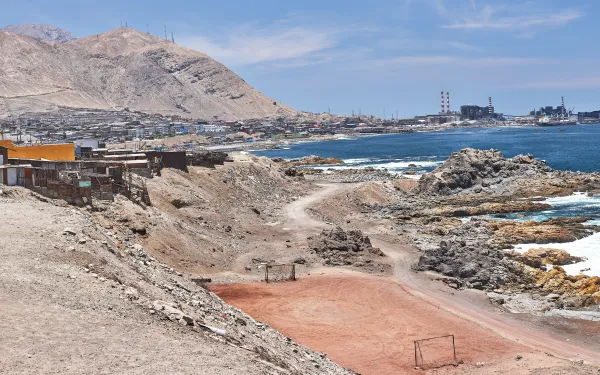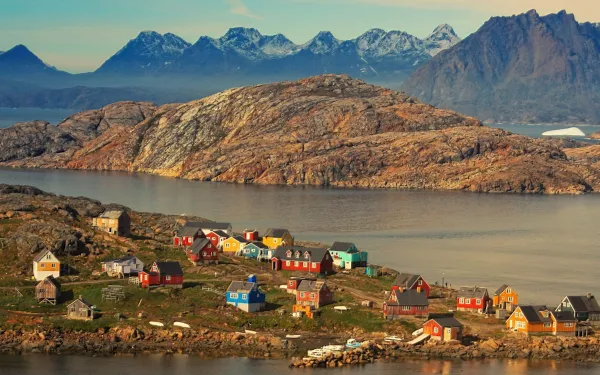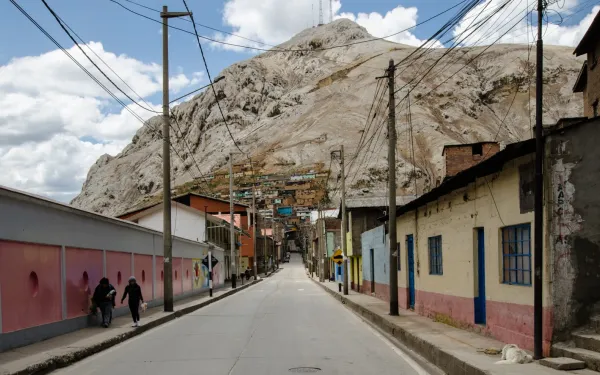
Project
Photo: Ana Rodríguez Carrington (CC BY 2.0)Victory: Biosphere Reserve in Baja California Saved from Toxic Mine
Known as an “ecological treasure house,” the Sierra La Laguna Biosphere Reserve at the southern tip of Baja California will not be spoiled by toxic mine waste, thanks in part to AIDA’s advocacy.
The reserve was once an island, so it’s home to rare plant and animal species. Canyons, swimming holes, and hot springs can be found in its granite mountain range and lowland tropical forests.
Thanks to AIDA and our partners in Mexico, the Mexican government denied an environmental permit for the Paredones Amarillos gold mine, halting the project for the time being. To protect the biosphere reserve, AIDA helped educate community groups and decision makers about the mine's risks. This helped to build the political momentum necessary for the government to deny the permit.
To extract gold from the mountains, the Canadian company Vista Gold proposed to carve out huge quantities of rock—each ton containing a mere gram of gold–-grind it into sludge, and treated it with cyanide. The company planned to dump massive amounts of toxic waste (called “tailings”) behind a dam intended to store it forever. Unfortunately, tailings dams can break for various reasons, as happened at Bolivia’s Porco mine in 1996. When that dam collapsed, more than a quarter million metric tons of tailings flooded the river and contaminated 500 miles (800 km) of waterways in Bolivia, Argentina and Paraguay.
The mine could also cause acid mine drainage. When sulfur-containing rocks are exposed to air and water, sulfuric acid forms, which causes toxic heavy metals to dissolve and drain into the watershed. The risk of acid mine drainage in Sierra La Laguna was significant and the human and environmental cost would have been tremendous: thousands of people and countless wildlife in the reserve rely on its water for survival.
Depleting freshwater is a further threat because mines use tremendous quantities of water. Owing to the scarcity of water in the reserve, Vista Gold proposed to build a plant on the Pacific coast to remove salt from sea water in a highly energy-intensive process, and then pump the water 45 km to the mine site. The desalination plant posed a threat to the endangered leatherback sea turtle.
Singly and together, the mine’s impacts would have devastated a rare jewel, a unique and lush paradise worth saving for future generations.
Related projects

The importance of the “how” in the energy transition
Of the global carbon dioxide (CO2) emissions from fossil fuels, one of the main causes of the climate crisis, nearly half come from coal use. Latin America is no stranger to the problem because it participates in both coal burning and the extraction of the mineral, which, after export, is used as a fossil fuel source in other parts of the world.In this context, the closure of coal-fired power plants—as is happening in Chile—is both great news and an opportunity to steer the energy transition toward justice.But in a just energy transition, the "how" matters: every step toward defossilization must ensure energy systems based on non-conventional renewable sources, respect for the environment and human rights, and responsible closure and exit processes. Thus, the Chilean case, which we explain below, is an important example of why the region needs to implement responsible decarbonization. When decarbonization causes more pollutionIn early 2024, AES Andes SA closed the Norgener thermoelectric power plant in Tocopilla, a coastal city in northern Chile. As part of the closure process, the company rapidly burned the 94,000 tons of coal it had stored at the plant, affecting a city already saturated with pollution and publicly recognized as an environmental sacrifice zone.The population of Tocopilla was exposed to potential health effects, including impacts on the respiratory system, increased risk of heart attacks, and—in children—perinatal disorders, developmental disorders, and impaired lung function, among others.The forced burning of coal was authorized by the National Electricity Coordinator (CNE)—the agency responsible for managing the various energy sources that enter the national electricity system—and displaced the use of renewable energy. To stop the burning, AIDA, Greenpeace, and Chile Sustentable, together with local communities, filed an appeal with the Santiago Court of Appeals to halt it, but the court's decision came after the coal had already been burned. Furthermore, the court ruled that the case should be reviewed by a specialized court in a more lengthy proceeding. A bad precedent for Chile and for the continentBy authorizing the burning of the remaining coal from the Norgener thermoelectric plant, the National Electricity Coordinator made an exception to the law governing the order of energy dispatch. Shortly thereafter, in September 2024, the agency issued an internal procedure to order the early closure of power plants. Although it is an attempt to streamline the closure process, the measure opens the door for other companies with coal-fired power plants in the process of closing to replicate what happened at Norgener: burn their remaining coal under the argument of “emptying stock” and generate energy that enters the national electricity system with priority, once again displacing energy from renewable sources. In Chile, the National Electricity Coordinator decides which unit dispatches its energy to the system at any given time based on a criterion of increasing economic merit, according to which the energy with the lowest variable cost enters first. However, the internal procedure stipulates—without sufficient regulatory backing—that the agency may authorize dispatching energy outside economic order so that coal-fired power plants consume their remaining fuel before closing. In response, AIDA, Greenpeace, Chile Sustentable, and MUZOSARE (Women in Sacrifice Zones in Resistance) filed a complaint on February 6, 2026, with the Superintendency of Electricity and Fuels against the Coordinator and his advisors for approving and implementing the measure. The complaint represents an opportunity to do things right: for the sector's regulatory body to ensure that the planning for the closure of thermoelectric power plants does not end up rewarding poor coal inventory management at the expense of communities' health and a just energy transition. What the energy transition needsIn 2019, the Chilean government committed to closing all coal-fired power plants in the country by 2040. Since that public announcement, the timeline has been accelerated. But the urgency of decarbonization should not be used to favor companies operating thermoelectric plants or to harm communities near polluting industries. Doing so weakens Chile's climate leadership and sets a bad example for any decarbonization process in the region. In a just energy transition, companies along the entire coal and other fossil fuel supply chain have an obligation to ensure the responsible closure and exit of their operations. The energy transition is not merely a change in technologies; it is an opportunity to rethink energy and development models and to correct injustices. This requires clear and appropriate rules that promote energy system security, competition, and a healthy environment.
Read more
5 key facts about “rare” earth elements
In recent weeks, you have probably read or heard the term "rare" earth elementsContrary to what their name suggests, they are more common in everyday life than you might think. In fact, many of the technological innovations we use daily would not be possible without them.So why are they being talked about so much right now?Because today, "rare" earth elements and other minerals considered "critical" are at the center of disputes over their control, given their usefulness in the manufacture of technologies for the energy transition and for the military industry.But aside from the geopolitical tensions surrounding the issue, there are basic questions that arise when we hear this term, which is why we answer them here.By understanding where the raw materials behind the technologies we use come from, we can also rethink the kind of future we want. What are "rare" earth elements?There are 17 metallic elements, similar in their geochemical properties, used in many of today's technologies, from cell phones to electric cars.They include the 15 lanthanides of the periodic table of chemical elements—lanthanum, cerium, praseodymium, neodymium, promethium, samarium, europium, gadolinium, terbium, dysprosium, holmium, erbium, thulium, ytterbium, and lutetium—as well as scandium and yttrium.Promethium is usually excluded from this group because under normal conditions its half-life is short. Are they really rare?Contrary to what one might think, they are not "rare" in abundance, but rather in concentration. In other words, deposits with high concentrations are rare, making their exploitation and processing difficult. As a result, most of the world's supply comes from a few sources.But when they were discovered (in the 18th and 19th centuries), they were less well known than other elements. The most abundant "rare" earth elements are similar in concentration in the Earth's crust to common industrial metals (chromium, nickel, copper, zinc, molybdenum, tin, tungsten, or lead). Even the two least abundant rare earth elements (thulium and lutetium) are almost 200 times more common than gold. What are "rare" earth elements used for?They have unusual fluorescent, magnetic, and conductive properties, making them attractive for a wide range of applications.They are present in everyday objects such as smartphones, screens, and LED lights.In renewable energy, they are used to manufacture wind turbines and electric cars.Its most specialized uses include medical devices and military weapons. Where are they?They exist in various parts of the world, but just because a country has reserves does not mean that it exploits them. The countries with the largest reserves are:China: 44 million tons.Brazil: 21 million tons.India: 6.9 million tons.Australia: 5.7 million tons.Russia: 3.8 million tons.Vietnam: 3.5 million tons.United States: 1.9 million tons.Greenland: 1.5 million tons.In Latin America, besides Brazil, other countries where "rare" earth elements have been identified are Argentina, Chile, Bolivia, Colombia, and Peru. Why is there so much talk about them now?The energy transition is intensifying competition for access to raw materials—including rare earth elements—needed for renewable energy technologies.To promote and facilitate access to these and other resources, some countries and international organizations refer to them as "critical."But they are not only important for renewable energy. "Rare" earth elements are also key to the military industry.Because global supply is concentrated in a few sources, there is growing interest among some countries in the Global North in controlling access to these resources. What are the impacts of their exploitation?The extraction of "rare" earth elements is mainly carried out in open-pit mines, which have serious environmental and social impacts:Water, air, and soil pollution.Heavy use of water and toxic chemicals.Radioactive waste.Loss of biodiversity.Health risks.Forced displacement of communities.Increased risk of economic inequality. "Rare" earth elements and other minerals considered "critical" are at the center of current debates over who controls their exploitation and production.As these are natural resources, often found in indigenous territories and critical ecosystems, a more urgent discussion is what kind of progress we want: one that encourages the excessive exploitation of resources, or one that respects the environment and people? If you would like to learn more about this topic, here are the links to the sources we consulted: USGS, Rare Earths Statistics and Information: https://www.usgs.gov/centers/national-minerals-information-center/rare-earths-statistics-and-inform… USGS, "Fact Sheet: Rare Earth Elements-Critical Resources for High Technology": https://pubs.usgs.gov/fs/2002/fs087-02/ Science History Institute, History and Future of Rare Earth Elements: https://www.sciencehistory.org/education/classroom-activities/role-playing-games/case-of-rare-earth… USGS, "The Rare Earth Elements-Vital to Modern Technologies and Lifestyles": https://pubs.usgs.gov/fs/2014/3078/pdf/fs2014-3078.pdf Institute for Environmental Research and Education, "What Impacts Does Mining Rare Earth Elements Have?": https://iere.org/what-impact-does-mining-rare-earth-elements-have/#environmental_impact_studiesLatin America’s opportunity in critical mineralsfor the clean energy transition: https://www.iea.org/commentaries/latin-americas-opportunity-in-critical-minerals-for-the-clean-ener…U.S. Geological Survey, Mineral Commodity Summaries, January 2025 : https://pubs.usgs.gov/periodicals/mcs2025/mcs2025-rare-earths.pdf pg 145
Read more
Victims in La Oroya call on the President of Peru to comply with the Inter-American Court ruling after nearly two years of delays
The group of victims recognized by the international court emphasizes the urgency of implementing the ruling on issues related to ending pollution in the city of La Oroya, providing comprehensive and specialized medical care, and paying compensation. La Oroya, Peru. Victims of decades of pollution caused by the operations of the La Oroya Metallurgical Complex sent a letter to the President of the Republic on December 19, 2025, urgently requesting compliance with the Inter-American Court of Human Rights' ruling ordering the Peruvian State to adopt comprehensive measures of justice and reparation. In the letter, part of the group of 80 victims recognized by the international court in the La Oroya v. Peru case, the group emphasizes compliance with the ruling on issues related to pollution prevention in the city, comprehensive and differentiated medical care, and the payment of compensation."Mr. President, do we have to wait another 20 years to obtain some kind of reparation? Since we began this long struggle, seven people from this group of victims have died without obtaining justice. Two of them, including a minor, died as a result of health damage caused by pollution in La Oroya, as the Inter-American Court of Human Rights confirmed in its ruling," the victims point out.Their request comes after almost two years of delays in the effective implementation of the ruling, notified on March 22, 2024, and after the Inter-American Court of Human Rights notified its interpretative judgment in November last year, in which it referred only to certain specific aspects of the original judgment that required further clarification to facilitate its execution. These points relate to health care measures, the relocation of affected persons, follow-up deadlines, compensation, and the acknowledgment of responsibility and a public apology.However, both the victims and the organizations supporting their struggle emphasize that, as established by the Inter-American Court, all orders in the original judgment are in force and fully enforceable from the moment they were issued in March 2024, with no legal impediment to immediate compliance.An essential step in achieving this is the urgent publication of the resolution determining jurisdiction by the Attorney General's Office."The victims have resorted to all legal and institutional mechanisms to access justice and see their rights restored. Today, preventing the population of La Oroya from continuing to be exposed to environmental pollution, guaranteeing comprehensive health care for those who have been affected by toxic metals, and ensuring the payment of compensation ordered by the Court are necessary and fully implementable steps for the Peruvian State to comply not only with its international obligations, but also with its fundamental duty to protect the life, health, and dignity of the people who inhabit its territory," said Rosa Peña, senior attorney at the Interamerican Association for Environmental Defense (AIDA). Christian Huaylinos, from the legal department of the Pro Human Rights Association (APRODEH), highlighted the importance of implementing the ruling throughout the country: "Several of the provisions ordered by the Court are relevant at the national level, meaning that they benefit Peruvian citizens in general in relation to pollution from mining and metallurgical activities. These include harmonizing national-level air quality regulations, guaranteeing respect for human rights and due diligence, and designing and implementing an air and water quality information system in areas of Peru with greater mining and metallurgical activity. In this regard, achieving timely and efficient compliance by the State represents the significance of the case for the benefit of all Peruvians."The victims emphasize that, given the clarifications made by the Inter-American Court in its interpretative judgment, there is no justification for the institutional delays that for more than two decades have prevented access to justice and reparation for the families affected by the pollution generated by the La Oroya Metallurgical Complex.This case has become one of the most important precedents in Latin America for protecting the rights to a healthy environment, clean air, and health, especially for communities exposed to highly polluting business operations. After more than 20 years of struggle, the victims hope that the Peruvian State will finally guarantee the justice and reparation ordered by the Inter-American Human Rights System. The victims, the population of La Oroya, and the organizations involved in the case reiterate their willingness to collaborate with the responsible institutions to ensure the effective implementation of all measures and to move toward comprehensive reparation and non-repetition.Press contactVíctor Quintanilla (Mexico), AIDA, [email protected], +521 5570522107
Read more